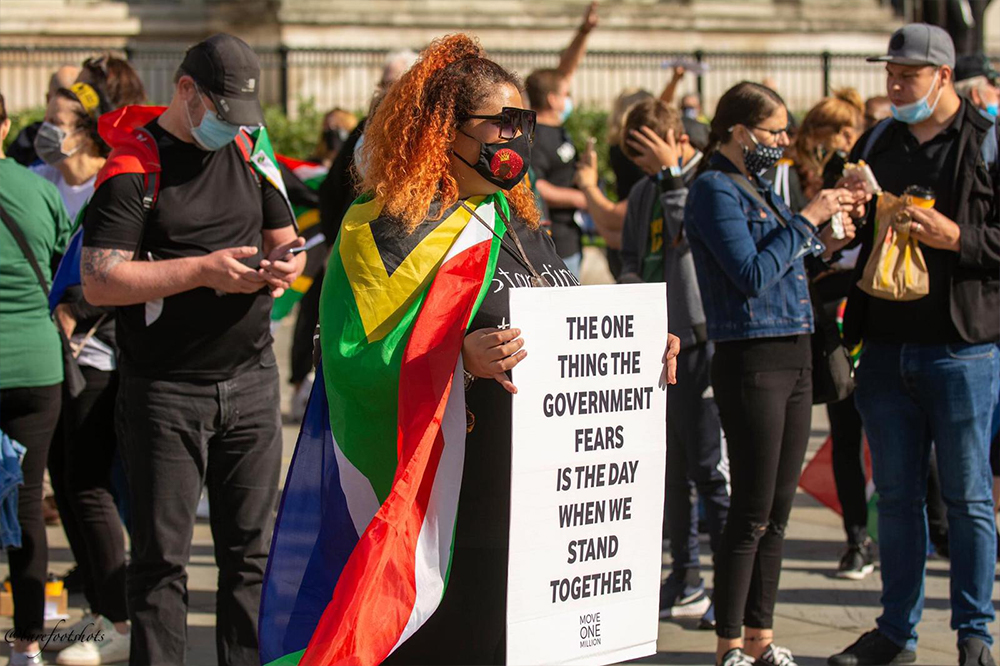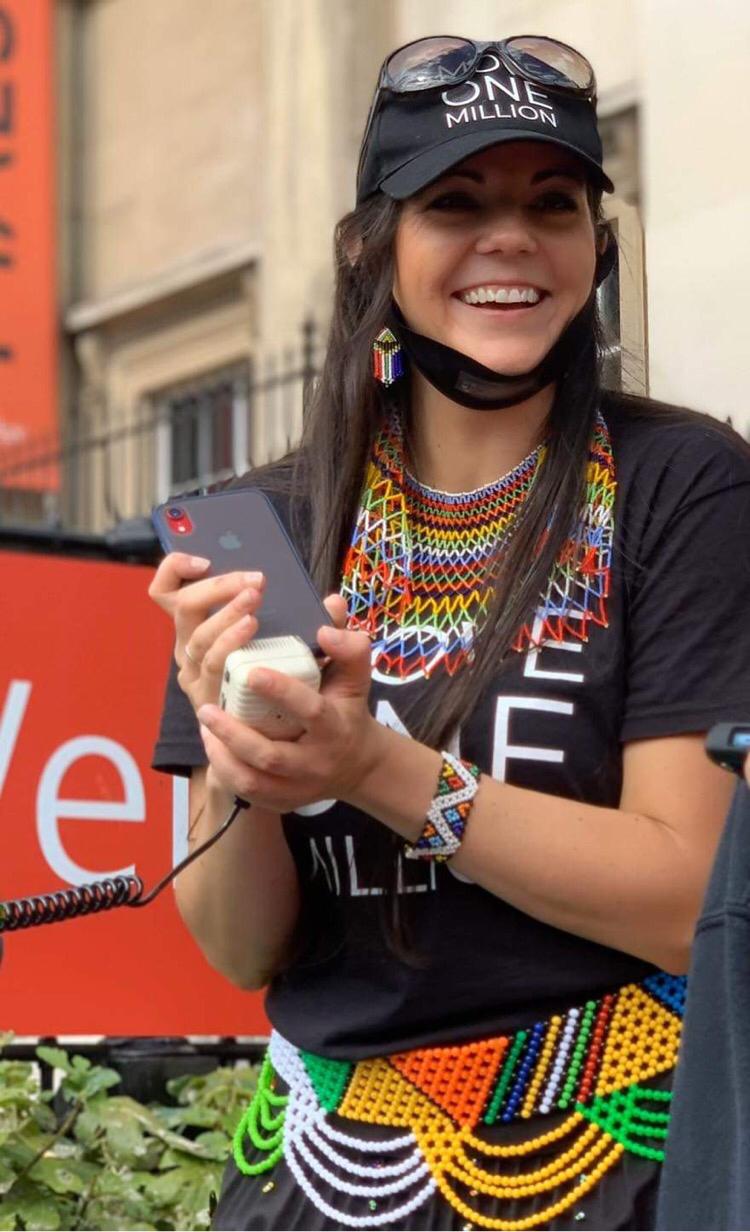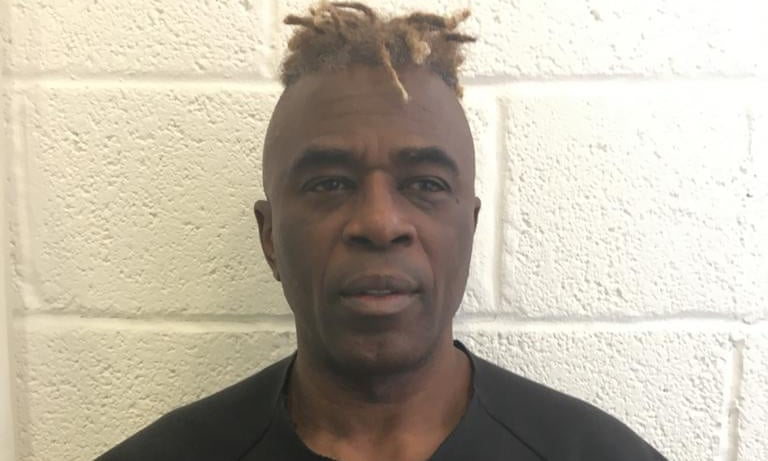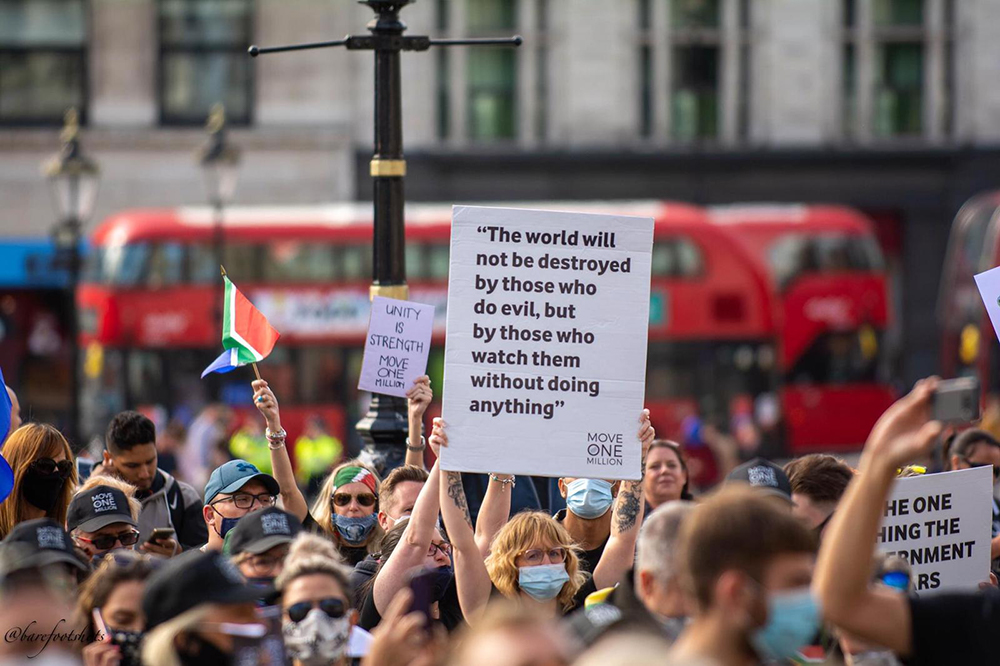“I am a single mum who is already highly in debt … it would be devastating,” said Hayley Reichert, 35, of the £10,000 fine she potentially faces after organising a protest in London.
The British-South African dual national helped to assemble a crowd of about 600 people near central London’s National Gallery on Saturday in support of the Move One Million movement.
Established in South Africa two months ago, the campaign’s aims include reforming the country’s electoral system as well as tackling corruption and gender-based violence.
Reichert is believed to be one of 20 people, involved in five separate gatherings representing different causes, reported to the Metropolitan Police for consideration of a £10,000 fixed penalty notice (FPN) for allegedly breaching coronavirus restrictions.
Other implicated demonstrations include an anti-capitalist ‘Resist the Government’ rally, protests by environmental campaigners Extinction Rebellion (XR), and another held by members of the UK’s Ivory Coast diaspora near Whitehall.
“Over the past week, the Met has managed various protests across central London which have caused serious disruption to local communities,” commander Kyle Gordon, gold commander for the Met’s weekend policing operation, said in a statement.
“Throughout this period we have become increasingly concerned the organisers of these events have not always taken all reasonable measures to limit the risk of transmission of coronavirus, thereby posing a risk, not only to those involved, but the wider public and communities of London.”
A Met police spokesman told EachOther on Tuesday that the cases are still being investigated and decisions have not yet been made.

Move One Million protested outside the National Gallery on Saturday. Credit: Lucas Janse van Vuuren
Under earlier coronavirus laws, people participating in lawful protests could be fined up to £100, rising to £3,200 for six repeated offences.
However, under the current version of the Health Protection Regulations, anyone found to be “holding” or “involved in holding” an unlawful gathering of more than 30 people could now face a £10,000 fine.
There are exemptions for gatherings organised by businesses, charities, public authorities and ‘political bodies’ provided certain conditions are met – namely completing a satisfactory risk assessment and taking “all reasonable measures” to minimise the spread of Covid-19.
Piers Corbyn, the 73-year-old brother of ex-Labour leader Jeremy Corbyn, became one of the first people to receive a £10,000 FPN for his involvement in an anti-lockdown rally which took place in Trafalgar Square last month. He has said he will challenge the FPN in court.
With new cases of coronavirus rising by more than 2,000 in the UK for three consecutive days, the web of restrictions in England is continuing to evolve at pace.
Last night the government announced further plans to ban gatherings of more than six people from Monday, 14 September, punishable by £100 fine, doubling to a maximum of £3,200 for repeated offences.
The government is yet to published the legal text of this forthcoming change, so it is not clear how exactly it will affect the existing rules concerning £10,000 fines for those holding unlawful gatherings of more than 30.
However it has updated its guidance for the public – which in the past varied from what the law explicitly permits and forbids. Listed among the exceptions to the new ‘rule of 6’ are “protests and political activities organised in compliance with Covid-19 secure guidance and subject to strict risk assessments”.
Human rights groups and lawyers have expressed concerns that the “life-changing” nature of the £10,000 FPN, which cannot be appealed, as well as “onerous” safety requirements could deter people from engaging with legitimate protest. On Friday, the Met Police warned XR that their risk assessments explaining how they would minimise Covid transmission did “not meet the required standard”.
‘I went into full panic mode’

Hayley Reichert. Credit: Supplied
Reichert told EachOther how she received an email from her Met police contact person at midday on Friday, informing her that the protest she had planned the following morning could constitute an offence under the coronavirus restrictions, and she could face a £10,000 fine.
The email contained a series of questions including: whether she considered her group “exempt”, whether they had conducted a health and safety risk assessment, and if they were aware of the Extinction Rebellion protests set to take place.
“I went into full panic mode,” Reichert said.
She provided the police with a risk assessment for the planned demo in the early hours of Saturday morning and told them her group – which is not a formal legal entity and considers itself to be ‘non-political’ – is not exempt.
Reichert said she considered cancelling the protest but, after speaking with other organisers, decided to go ahead, taking a “militant” approach to making their activities Covid-secure.
“Covid is here to stay,” she said. “We need to use this as an example to show that it is possible.”
She pointed towards to what she felt was an inconsistency between the UK government’s encouragement for people to visit restaurants, while introducing restrictions on protests.
The measures taken by her group included informing protesters they had to confirm attendance, which was limited, ahead of time. The group also recorded details of more than 90% of attendees for test and trace purposes. Two first aiders were present, marshals took protesters’ temperatures. Attendees had to wear masks and markings were put on the floor in gaffa tape to ensure the crowds maintained physical distancing.
Police in attendance reportedly remarked to protesters that theirs was the most safely organised demonstration they had seen, she claimed.
Is she deterred from planning future demonstrations?
Speaking before the government announced its ban on groups of more than six, Reichert said her movement could think creatively about how to protest within the restrictions.
She intends to fight any fine she may receive and, while the financial impact would be “devastating” for her, she hopes it would create a conversation in the UK around the aims of the movement.
‘We feel oppressed and silenced’
Meanwhile on Friday, trans rights activist Thaniel Dorian cancelled a demonstration organised to take place in Parliament Square the following day after receiving a similar email from the Metropolitan Police.
“On 3rd September we liaised with the Met police and they assured us, after the news of Piers Corbyn’s arrest, that there would be no risk of arrests or fines because our protest posed no risk of danger,” a statement said.
“[On Friday] the police called us and informed us that there is a likelihood that us, any participants, stewards and even BSL interpreters of the Trans Rights Protest will be arrested on 5th September”.
The group decided “it would be dangerous for attendees, volunteers and all concerned if we went ahead with our planned events”.
Dorian told EachOther the police claimed “now only exempt political groups were allowed to protest and that our cause was not exempt”.
“We feel that it is a likely violation of the Human Rights Act and that the police and government are actively targeting marginalised groups by making them feel threatened and unable to practice free speech safely,” added Dorian, who intends to take legal action.
“This was a massive blow to everyone involved and has left people, ourselves included, feeling oppressed and silenced.”
The rally was set to feature a roster of 20 trans speakers. Around 1,000 people were expected to attend to lobby the government for reform of the 2004 Gender Recognition Act, aiming to make it easier for trans people to legally change their gender.
Thank you for all of the kindness and support.
We are looking to challenge to police’s illegal actions against us, and create a virtual protest to ensure our speakers are heard.
If you wish to support us in the meantime; https://t.co/o5ju6TSri2#transrightsprotest pic.twitter.com/NL7WNATv2n
— Trans Rights Collective UK (@ProtestTrans) September 6, 2020
Political Bodies

Ken Hinds. Credit: ITN Solicitors
What is considered to be a ‘political body’ – and consequently exempt from gathering restrictions, provided it meets necessary safety requirements – has emerged as a potential area of confusion.
This was an issue in a recent legal dispute between black community activist Ken Hinds, an organiser in the Million People March – an anti-racism protest which took place in London on 30 August – and the Metropolitan Police.
“After almost a month of discussion with the Met Police about the demonstration, Mr Hinds was informed by them that they believed the protest was not being organised by a ‘political body’ and therefore was unlawful under the regulations,” his solicitors said in a statement last month.
“They also informed him that he may be prosecuted if he continued to organise the protest, and may already have committed an offence.”
Hinds launched urgent legal action accusing the Met of discrimination. The latter later accepted that the protest was being organised by a political body and dropped their investigation.
Lochlinn Parker, of ITN Solicitors, who represented Hinds, told EachOther that the legal definition of what constitutes a political body has not yet been tested in court – but is likely to be much broader than many realise.
The current version of the restrictions draws its definition of political bodies from an earlier law – the Health and Social Care (Financial Assistance) Regulations 2009.
“Political campaigning organisations” are people carrying out activities to:
- promote or oppose changes in any laws or policies within the UK or in other countries
- affect public support for a political party, or to influence voters in any election or referendum
“It is likely it doesn’t need to be formally established and it doesn’t need to be an incorporated organisation,” Parker said. “It is likely though that the group will have to have identifiable principles and aims.”
This definition should be able to cover a wide range of situations, for example, a community group deciding to stage a protest about roadworks taking place near a school, he said.
“The police do have a discretion to interpret it as they see fit, which opens up the potential for discrimination in some cases,” he said.
“However, the court is likely to think that there is an obvious crossover between being established enough as an organisation and being responsible and competent enough to have completed a satisfactory risk assessment.”
Parker also expressed concerns at how the restrictions may in effect require protest organisers to identify themselves to the police ahead of time, which was previously not required.
“Mandatory identification of organisers is an issue, because, as we’ve seen over many decades, the police gather significant amounts of information on protesters and do not always use this information properly,” he said.
As coronavirus cases continue to increase in the UK, the government is under pressure to take measures to prevent a ‘second wave’.
The Metropolitan Police Federation has called for the draconian step of banning protest completely.
Monitoring group Netpol has reminded officers they “have a positive duty to facilitate and protect rights to freedom of assembly.
“Taking to the streets to oppose government policy is a cornerstone of our democratic process,” it tweeted.
It is inherently difficult to know how many people have been deterred from engaging in legitimate forms of protest by the looming threat of £10,000 fines.
It is likely that many people who might otherwise have turned out in force, will now be unwilling or unable to the risks.
From throwing themselves in front of racehorses to gluing body parts to trains, activists have long gone to extreme lengths to further causes.
With the end of the pandemic nowhere in sight, it seems people aiming to pioneer safe forms of protest amid the new normal are at risk of being hit with “devastating” penalties.

